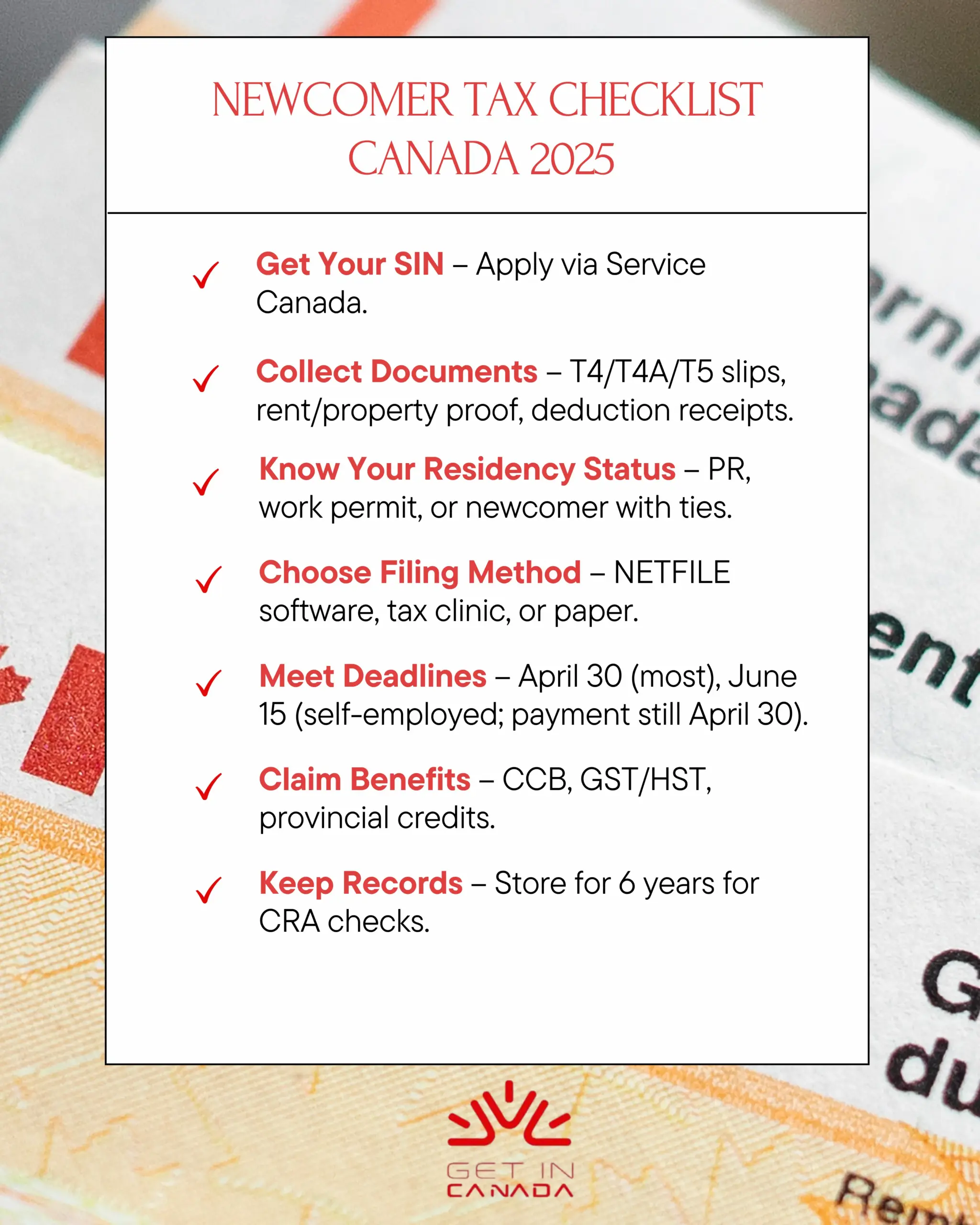Tax in Canada Guide for Newcomers in 2025
New to Canada? Everything You Need to Know About Taxes in Canada
Starting a new life in Canada means adapting to many new systems, and taxes are one of the most important. Understanding how the Canadian tax system works can help you avoid costly mistakes, claim valuable benefits, and stay compliant with government rules. Whether you’re filing your first tax return or just trying to understand your payslip, this guide will walk you through everything you need to know for 2025.

1. Understanding the Canadian Tax System
Canada’s tax system is progressive; meaning the more you earn, the higher your tax rate. Taxes are collected by both the federal government and provincial/territorial governments to fund services like healthcare, education, infrastructure, and social programs.
Key points:
- Federal Taxes are set by the Canada Revenue Agency (CRA).
- Provincial/Territorial Taxes vary depending on where you live.
- Both taxes are filed together on one return.
You can learn more from the CRA official website here: CRA – Income Tax.
2. Who Needs to File Taxes in Canada?
Anyone who earns income in Canada, whether from a job, business, or investments, usually needs to file a tax return; newcomers must file a tax return if:
- Earned income in Canada (salary, self-employment, rental income, etc.)
- Want to claim benefits like the Canada Child Benefit (CCB) or GST/HST credit.
- Want to get a tax refund from over payment.
Even if you arrived in Canada partway through the year, you’ll still file taxes for the portion of the year you were a resident. Newcomers are considered tax residents if they establish significant ties, such as:
- A home in Canada
- A spouse/common-law partner or dependents in Canada
- Personal property and bank accounts in Canada
Book Your Consultation Session →
3. Types of Taxes in Canada for Individuals
Canada’s tax structure includes several kinds of taxes you should know:
a. Income Tax – Based on your annual income from all sources.
b. Sales Tax (GST/HST) – Applied to most goods and services; rates vary by province.
c. Property Tax – Paid to municipalities if you own property.
d. Payroll Deductions – Employers deduct CPP (Canada Pension Plan) and EI (Employment Insurance) from your salary.
To calculate your estimated income taxes, you can use the Income Tax Calculator – Canada.
Income Tax Rates by Province/Territory – 2025
| Province/Territory | Lowest Rate (on first taxable income bracket) | Highest Rate (on top income bracket) | Combined Top Federal + Provincial Rate |
|---|---|---|---|
| Alberta | 10% | 15% | ~48% |
| British Columbia | 5.06% | 20.5% | ~53.5% |
| Manitoba | 10.8% | 17.4% | ~50.4% |
| New Brunswick | 9.4% | 19.5% | ~52.5% |
| Newfoundland & Labrador | 8.7% | 21.8% | ~54.8% |
| Nova Scotia | 8.79% | 21% | ~54% |
| Ontario | 5.05% | 13.16% | ~53.5% |
| Prince Edward Island | 9.8% | 18% | ~51.4% |
| Quebec | 14% | 25.75% | ~53.3% |
| Saskatchewan | 10.5% | 14.5% | ~47.5% |
| Yukon | 6.4% | 15% | ~48% |
| Northwest Territories | 5.9% | 14.05% | ~47% |
| Nunavut | 4% | 11.5% | ~44% |
4. Taxes in Canada on Salary: Understanding Your Payslip
Your Canadian payslip shows deductions for federal and provincial income taxes, Canada Pension Plan (CPP), and Employment Insurance (EI). Understanding these helps you see exactly how much tax is taken from your salary and why.
Your monthly or bi-weekly pay stub in Canada includes deductions for:
- Federal income tax
- Provincial/territorial tax
- CPP contributions
- EI premiums
For example, if you earn CAD 60,000 in Ontario in 2025:
| Deduction Type | Approx. Annual Amount |
|---|---|
| Federal Tax | CAD 6,200 |
| Provincial Tax | CAD 3,000 |
| CPP | CAD 3,867 |
| EI | CAD 1,049 |
Net salary after deductions: ~CAD 45,884 (actual may vary).
Book Your Consultation Session →
5. Last Day to File Taxes in Canada (2025)
The deadline to file your 2024 tax return is April 30, 2025.
If you or your spouse/common-law partner are self-employed, you have until June 15, 2025, but any taxes owed must still be paid by April 30 to avoid interest charges.
If you miss the deadline:
- Late-filing penalty: 5% of the balance owed + 1% for each month you’re late (up to 12 months).
- Interest on unpaid taxes starts accruing from May 1.
More info here: CRA – Filing your tax return.
6. How to File Your Taxes in Canada as a Newcomer
Filing taxes for the first time in Canada can feel overwhelming, especially if you’re still learning how the system works. As a newcomer, the process involves gathering the right documents, choosing a filing method, and understanding the credits and benefits you may qualify for. Filing taxes can be done in several ways:
- Online through NETFILE-certified software (e.g., TurboTax, Wealthsimple Tax).
- By paper (mailing the T1 General form to CRA).
- Through a tax professional or community tax clinic.
If you’re a newcomer, you’ll also need to fill out the Newcomer Schedule (Form 5013) to report your arrival date and worldwide income before becoming a Canadian resident.
7. Benefits and Credits You Can Claim as a Newcomer
Filing your taxes not only keeps you compliant but also opens the door to valuable benefits. As a newcomer, you could access payments like:
- Canada Child Benefit (CCB) – Monthly, tax-free payment for families with children under 18.
- GST/HST Credit – Quarterly payment to help offset sales taxes.
- Provincial benefits like Ontario Trillium Benefit or BC Climate Action Tax Credit.
Learn more about benefits: Canada Child Benefit.
8. Tips to Make Tax Filing Easier for Newcomers
- Keep all income slips (T4, T5, T4A, etc.) in one place.
- Track expenses if you’re self-employed — you may claim deductions.
- Sign up for CRA My Account to access your tax info online.
- Use CRA’s Auto-fill my return feature if possible.
- File early to avoid last-minute delays.
9. Common Tax Mistakes Newcomers Make
- Missing the April 30 deadline.
- Not reporting worldwide income.
- Forgetting to apply for benefits.
- Not keeping receipts for deductible expenses.
- Using the wrong residency status on the tax return.
Tax in Canada 2025
Understanding taxes in Canada is an essential part of building your new life here. From knowing the deadlines and rates to learning about the credits and deductions you can claim, being informed will save you money and prevent unnecessary stress.
Filing your taxes on time not only keeps you compliant with Canadian law but can also unlock valuable benefits and refunds that support you in your first years. Whether you file on your own or seek professional help, the key is to stay organized, keep your documents safe, and make use of trusted resources like the Canada Revenue Agency. As a newcomer, mastering the tax system is just another step toward feeling at home in Canada, and ensuring your financial foundation is strong for the future.
For more Canadian visa inquiries? Click here to start the process with our help →
FAQs About Taxes in Canada for Newcomers
1. When is the last day to file taxes in Canada?
The general deadline for most individuals is April 30, 2025. If you or your spouse/common-law partner are self-employed, you have until June 15, 2025 to file, but keep in mind that any taxes owed are still due by April 30. Filing late can lead to penalties and interest, so it’s always safer to submit on time, even if you can’t pay the full amount immediately.
2. Do newcomers have to pay taxes on income earned outside Canada?
Yes, if the Canada Revenue Agency (CRA) considers you a resident for tax purposes, you must report your worldwide income, even if it was earned before moving. However, you may be eligible for foreign tax credits to avoid double taxation. If you’re unsure of your residency status, CRA’s Newcomers to Canada tax guide can help.
3. How much tax will I pay on my salary in Canada?
Canada has a progressive tax system, meaning the more you earn, the higher your tax rate on the top portion of your income. Your total taxes depend on:
- Federal income tax rates
- Provincial or territorial tax rates
- Possible deductions and credits
To estimate your taxes, you can use the official CRA Income Tax Calculator.
4. Can I file my taxes online as a newcomer?
Absolutely. If you have a Social Insurance Number (SIN) and the required documents, you can use a CRA-approved NETFILE software, many of which are free. Popular options include SimpleTax, TurboTax, and Wealthsimple Tax. Alternatively, you can use a registered tax professional or attend free tax clinics offered by community organizations.
5. What benefits can I get after filing taxes in Canada?
Filing your taxes isn’t just about paying the government; it’s also how you access benefits and credits, such as:
- Canada Child Benefit (CCB) – monthly, tax-free payments for families with children under 18
- GST/HST Credit – quarterly, tax-free payments to offset sales taxes for lower-income households
- Provincial/Territorial Benefits – e.g., Ontario Trillium Benefit, BC Climate Action Credit
If you don’t file, you won’t receive these payments, even if you qualify.
6. What happens if I miss the tax filing deadline in Canada?
If you owe taxes and miss the deadline, CRA charges a 5% late-filing penalty plus 1% of the balance owed for each full month you’re late, up to 12 months. Interest also applies. If you don’t owe taxes or are expecting a refund, you won’t face penalties, but you might delay benefits like the GST/HST credit or CCB.
7. Do I need a tax accountant in Canada, or can I do it myself?
It depends on your situation. If your income is simple (salary only, no investments or self-employment), using online tax software is usually straightforward and affordable. If you have multiple income sources, foreign assets, or business income, hiring a tax professional can save time and reduce costly errors.
8. Are taxes in Canada deducted automatically from my paycheck?
If you’re employed, your employer will withhold income tax, Canada Pension Plan (CPP) contributions, and Employment Insurance (EI) premiums directly from your salary. You’ll receive a T4 slip at tax time summarizing these deductions and your earnings.











